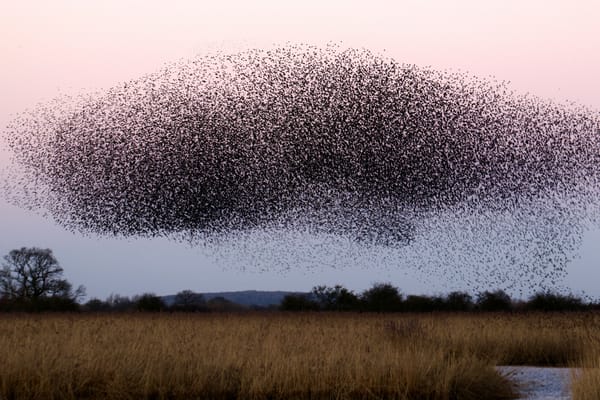“Weird” Might Save America
A wordsmith’s take on why, and how you too can help

For reasons of time and sanity, I do not go out looking for political news. I have a system where it comes to me, slowly, by email and podcast, from carefully curated sources. That way I get to miss:
much of the ultimately trivial media churn, and
all of the bullshit “alternative facts”.[1]
By the time I heard about “weird”, it was nearly a week old; it had started with the governor of Minnesota but had already been picked up and repeated three or four times by the Harris campaign and other Democratic speakers. It was only the repetition that had pushed it up into my sphere of awareness.
Before I even got to the end of the paragraph, I yelled “YES!” and did a fucking hallelujah touchdown dance right then and there in my kitchen, because I knew this was what Democrats had been missing for so long.
The last month has been, as they say, quite a year. We’re heading into Phase Two of our house remodel, a project for which I am not only architect and interior designer but now also general contractor (since our Phase One contractor burned us so badly in 2022 that handling it ourselves — with no prior experience! in a foreign country! and a foreign language! — seemed like the comparatively sensible approach).
About a week after the presidential debate, after Biden announced that no one but “the Lord Almighty” was going to get him to change his mind, I stood looking around at our mostly-deconstructed second bedroom with a measuring tape forgotten in one hand and a sick sort of numbness in my gut, mentally trying to calculate how many months it would be before we could offer the room as a refuge to people fleeing a fascist dictatorship to the north.
Over the next two weeks I slowly wrote half of a very bleak essay for Nine Lives, while emotionally trying to come to terms with a future in which I was a permanent exile from my home nation. (I’ve always hoped and planned to come back to America eventually, but while there are many reasons why someone might continue living in a country while it transforms into a fascist totalitarian hellscape, there aren’t many circumstances in which it makes sense to return to a fascist totalitarian hellscape you’ve already left.)
And then Biden finally sat his ass the fuck down and there was just a sliver of a ghost of a chance of a future that was not literally a nonstop nightmare for the remainder of my potential lifespan, and I set that essay aside. But I didn’t actually start to have significant hope until things got “weird”.
Fear is the mind-killer
The hardest, most frustrating lesson I’ve learned from watching the last decade of American politics is that for most people, whether something a politician says is true or false matters at best very little and often not at all. Like many autistics, I am hard-wired for rigorous honesty, so I find this situation excruciating. The only way I’ve been able to keep my blood pressure at non-lethal levels is to conceptualize political campaigns as a kind of bizarre storytelling competition.
The modern Republican Party, like a criminal gang extorting a “protection fee”, promises to be the strong man who will keep you safe from the very threats they cause.
The tip-off that Biden’s second-term campaign was utterly doomed and should by all rights have been a nonstarter was when it became clear that the best and really only message Biden had to offer was “I may not be great, but I’m your only alternative to unspeakable horrors.” (Which, insultingly, was only even true because his runaway ego made it true! There was no shortage of better options!)
There are two big reasons why this will never work. One, fear is the home field of the other side. The modern Republican Party bullies people into compliant inaction by keeping them constantly, relentlessly afraid. Then, like a criminal gang extorting a “protection fee”, they promise to be the strong man who will keep you safe from the very threats they caused.[2] It’s been practicing this tactic for decades and has gotten very, very good at it (see: Fox News).
Democrats are never going to be able to beat Republicans on fear; it’s foolish to even try. And setting up their own protection racket — which was essentially what a Biden second term would be — just made it seem like there was no good choice at all: a perfect recipe for reduced voter turnout and a lost election.
Two, the Looming Existential Threat to American Democracy is one hundred percent real, it’s never in the history of America been more serious, and (especially given recent Supreme Court malfeasance) it’s really fucking hard to ignore!
But.
As any psychologist — or horror writer — could tell you, it’s not going to work to relentlessly pound “Looming Existential Threat” across an eight. month. campaign. People cannot endlessly exist in a state of terror. In a relatively short period of time — a week, maybe two — the body stops responding to cortisol. We go numb. We dissociate. We learn helplessness, which leads to apathy.
I don’t know about you, but I’ve been basically tharn for months.[3]
(Republicans keep their people from becoming too apathetic to be useful at the polls by selectively promoting anger and hatred — emotions that spark action, sometimes violent action — at other Americans, in the standard authoritarian tactic of ‘divide and conquer’. Republicans can afford to do that because their party constituency is relatively uniform in composition; Democrats, who are far more diverse, cannot.)
All year Democrats have been playing on the Republican home field, by Republican rules. Of course we were going to lose.
And then, from former football coach and quintessential Midwestern Dad Tim Walz: “These guys are just weird. They’re running for He-Man Women-Hater’s Club or something.”
Were you a weird kid?
I was a weird kid.
More specifically, I was an autistic girl growing up decades before anyone would begin to consider that autism might have anything to do with girls at all, much less one who appeared to be both highly verbal and intelligent. Officially I was labeled “gifted”, but unofficially, adults and kids alike pegged me as “weird”.
I was a baby giraffe in a herd of zebras: I never fit into any peer group anywhere, not until I was fifteen and had already spent a couple of solid years consciously and deliberately trying to modify my affect and behavior to be less off-putting. That year, I found the most open-minded and low-status group of kids (in my high school it was the drama club, almost all of whose members were in some way ‘weird kids’ themselves) and managed for the first time not to be rejected out-of-hand.
There were limits to how much I could hide my essential weirdness, though … including, it turned out, some pretty strong limits on the ways I even wanted to. All the way back to early elementary school, I had been occasionally presented with opportunities for peer acceptance if I would just do whatever mean thing everyone else in my class was doing; I kept choosing to be alone instead. As I shifted into adulthood, I both worked to mask my autistic traits so as to appear more “normal” on short acquaintance, while also leaning into “weird” as a personality. Just like any other disparaged minority who has sought to undermine the effectiveness of a slur by embracing it, I cheerfully acknowledged to all and sundry that yes, I was a “total weirdo”, until the word genuinely lost all sting for me. By my early twenties, I was proud of being fundamentally weird, and so were many of my (by then reasonably numerous) weird friends.[4]
I have zero hard data on this but — because I know a bit about how personality traits and cultural values sort out across the political spectrum — I’d make an educated guess that a lot of left-leaning Americans have had some kind of comparable outgroup experience. Exhibit A: my former hometown of Austin, Texas, which has been a tiny blue dot in a giant red state since … well, since ‘red’ and ‘blue’ took on their current political meanings (which for any youngsters out there was only twenty-four years ago). During that same year, Austinites were, by grassroots acclamation, adopting “Keep Austin Weird” as a public slogan for the city. The phrase (before it was coopted by capitalists[5]) was a way for the few hundred thousand Austin liberals to defiantly fly their freak flag amidst a sea of twenty million Texas conservatives.
Conversely, the Venn diagram overlap between people who wouldn’t be caught dead in a “Keep (Anything) Weird” t-shirt and people who identify as Republican has got to be very nearly a circle. That’s because conservatives, by and large, seek reassurance in authority and safety in conformity. Those whose ingroup status has never been challenged before (aka most straight white men): conservative. Those who have been on the outside and — for whatever reason of nature or nurture — responded not by doubling down on long necks and splotches but by putting on a striped coat and blending into the herd: also conservative.
Democrats can point out Trump’s lies from now until November, and he’ll just turn right around and call them liars as well, and the truth never does anything to move the needle. But “weird” is a lovely little linguistic weapon that cannot be turned back on its wielders.
Liberals and progressives generally don’t care how weird someone is, as long as they’re not hurting anyone else. You can’t tear down our leaders by poking fun at their awkward dance or their unrestrained laugh, because we mostly find those sorts of things endearing and relatable. The world has already labeled most of us weird, for one reason or another, and we don’t care anymore. We got inoculated in middle school.
Conservative leaders, on the other hand, are uniquely vulnerable to “weird”. In order to be a credible authority to people who respond to hierarchy and strength, in order to be a symbol of safety to people who take comfort in predictability and tradition, they must embody ‘normal’, if not supranormal. When their followers perceive them as ‘weird’, that becomes impossible.
‘Conservativism’, as a sociological concept, is morally neutral. A society made up entirely of progressives would be as desirable as a car with a gas pedal but no brake.
Let’s take a quick sidebar to make explicit that:
- ‘conservatism’ and ‘fascism’ are overlapping but not identical political stances, and
- I believe ‘conservativism’, as a sociological concept, is morally neutral.
A society made up entirely of progressives would be as desirable as a car with a gas pedal but no brake. People come in a variety of spectra for good evolutionary reason, is my thinking; societies, like species, do better with a mixture than a monoculture. But the current political incarnation of conservatism in America is fascist and totalitarian, which is very much a bad thing.
Researching, composing, and sourcing informative essays like this one require many, many hours of unpaid work. If you appreciate it and can afford to, please help me continue writing with a paid subscription at the Member or True Fan levels. Or you can leave a one-time, pay-what-you-can tip. Thank you for your support!
What to do about a fascist dictatorship
In the spring and summer of 2015, fresh off Thomas Piketty’s Capital in the Twenty-First Century, I spent a few months hyperfocused on teaching myself everything there was to know about How to (Successfully) Revolt Against Your Authoritarian Government. Because it sure looked to me like this was a thing Americans were going to need to know in the foreseeable future — my guess at the time was maybe ten or fifteen years.
Mind you, this was almost a year before Trump won the Republican nomination — I don’t remember if he was in the race yet when I finished reading Capital, but if he was, it was just barely, and absolutely no one else was taking him at all seriously, including me. My assessment had nothing to do with particular politicians and everything to do with systemic collapse.




